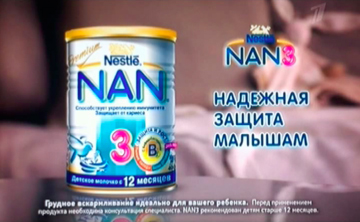Eye on Nestle - part 2
Nestlé weakens its formula marketing policy
Nestlé’s policy and instructions fail to respect the Code and subsequent, relevant Resolutions of the World Health Assembly.
Although monitoring evidence shows that Nestlé breaks its own weaker instructions, previously these claimed that Nestlé would not promote (in countries of its own choosing): "a) all infant formula and b) all follow-up formula products except in the rare instances where they have brand/label design which is distinctly different from infant formula."
In the version of the Instructions introduced in July 2010, Nestlé has weakened this by limiting the scope of its instructions to products up to 1 year of age: "They also apply to follow-up formula products which are marketed for consumption by infants up to 1 year of age."
 This came to light as Nestlé is increasingly promoting its formula brand names through milks for older babies, as in this example reported in Armenia. This is one of Nestlé "high risk" countries and so would not have been permitted under its old Instructions.
This came to light as Nestlé is increasingly promoting its formula brand names through milks for older babies, as in this example reported in Armenia. This is one of Nestlé "high risk" countries and so would not have been permitted under its old Instructions.
Change prompted by FTSE4Good?
Nestlé made the change shortly before FTSE introduced weakened criteria for its FTSE4Good ethical investment index in September 2010. Nestlé was added to the Index in March 2011 even while violating the World Health Assembly marketing requirements. FTSE assesses companies against their own policies rather than the International Code and Resolutions.
WHO speaks out against PAHO - Nestlé link
A Reuters Report (19 October 2012) revealed that the Pan American Health Organisation (PAHO) had accepted funding from various companies, including Coca Cola and Nestlé, prompting WHO to issue a clarifying statement:
"The World Health Organization (WHO) recognizes the importance of working with the private sector. However since part of our work involves setting norms, standards and guidelines for public health, we have very strict guidelines for accepting money from the private sector. WHO does not accept funds from the food and beverage industry for its noncommunicable diseases work. It is unfortunate that the Pan American Health Organization (PAHO-WHO) has accepted money from the food and beverage industry. PAHO - while it is a WHO regional office for the Americas – is, unlike the other regional offices, also the health agency of the Organization of American States. Therefore in some areas, PAHO has its own operating guidelines. Not all PAHO guidelines are aligned with WHO. One such area is collaboration with the private sector."
 Campaigners in the region launched a petition on the Care2 site and the logo shown left - http://bit.ly/QWyp1k
Campaigners in the region launched a petition on the Care2 site and the logo shown left - http://bit.ly/QWyp1k
Seven distinguished nutrition scientists, members of the World Public Health Nutrition Association, sent an open letter to Carissa Etienne, PAHOs new director calling for No more deals with Nestlé please.
http://www.wphna.org/2013_mar_hp1_paho.htm






